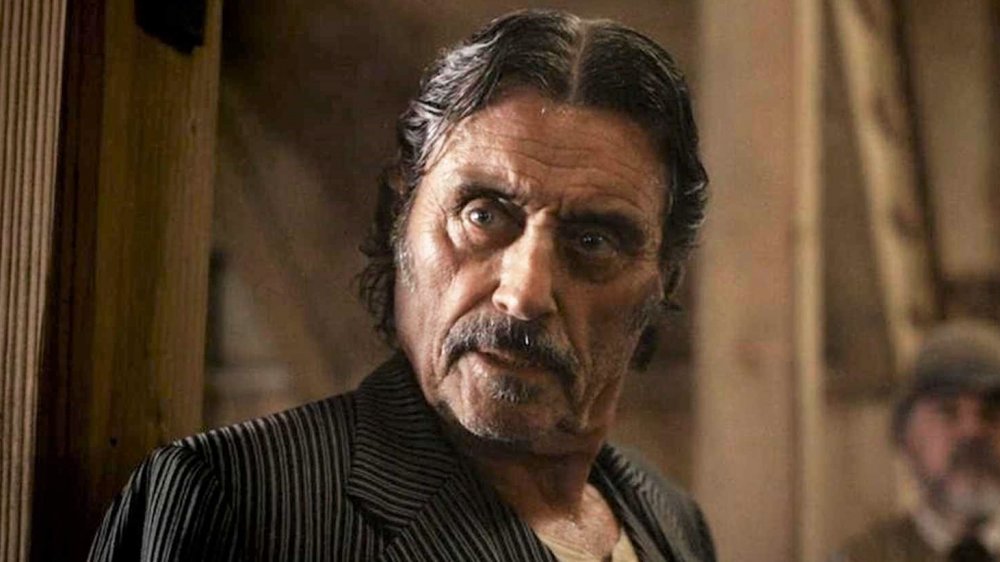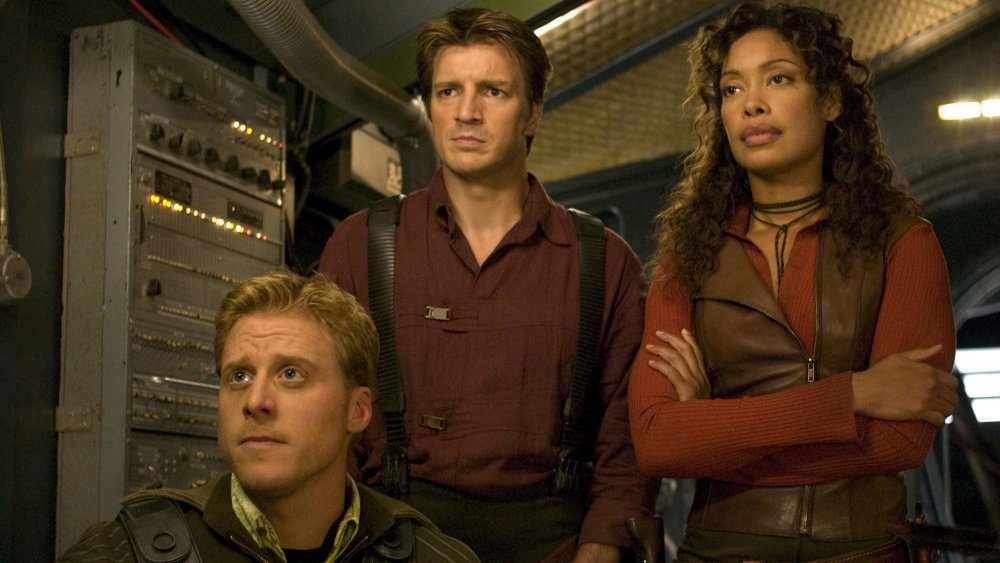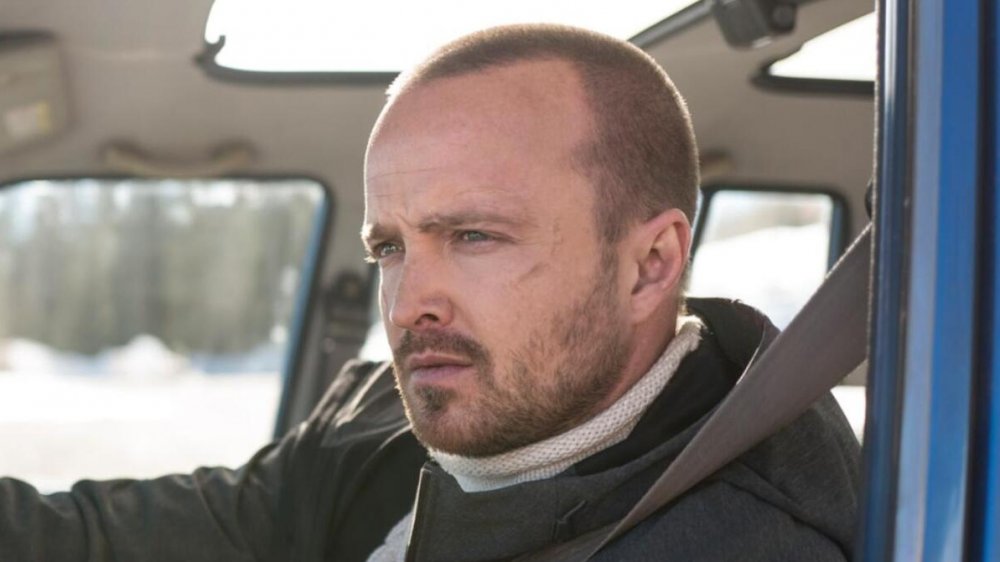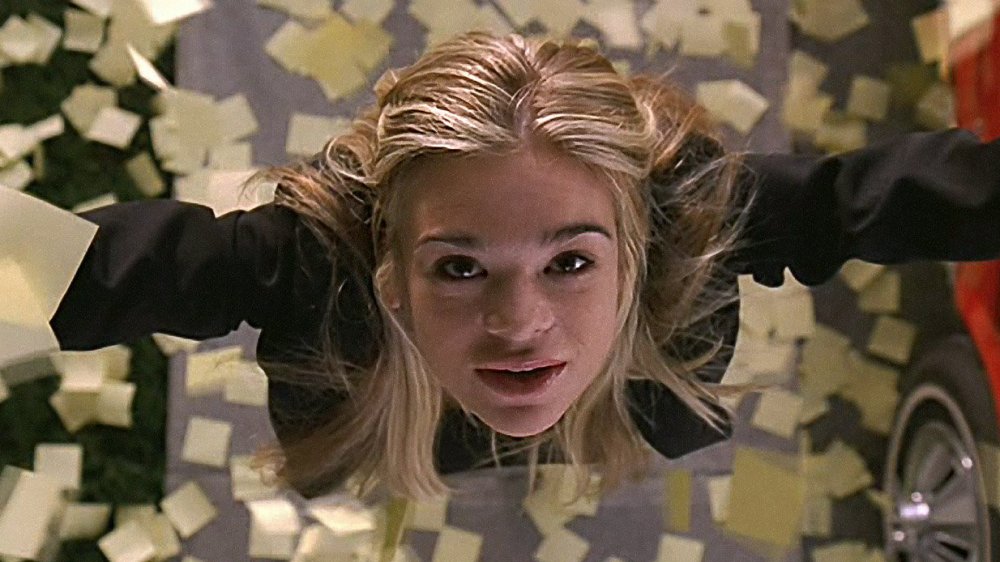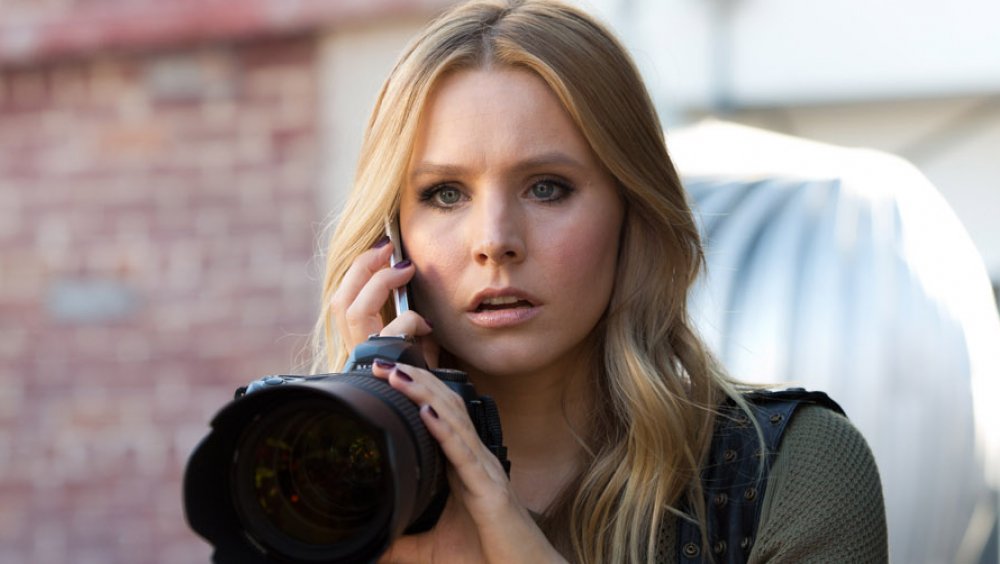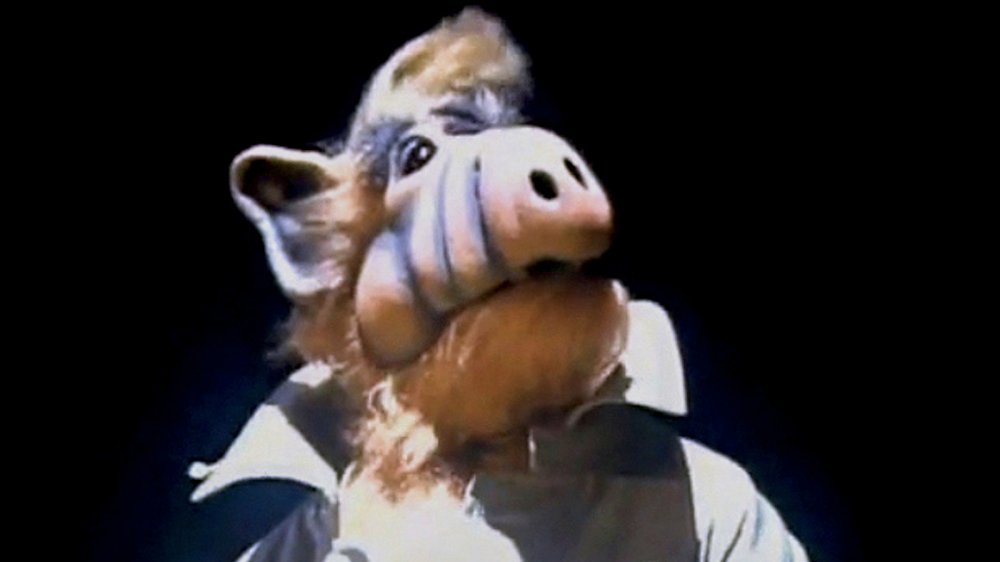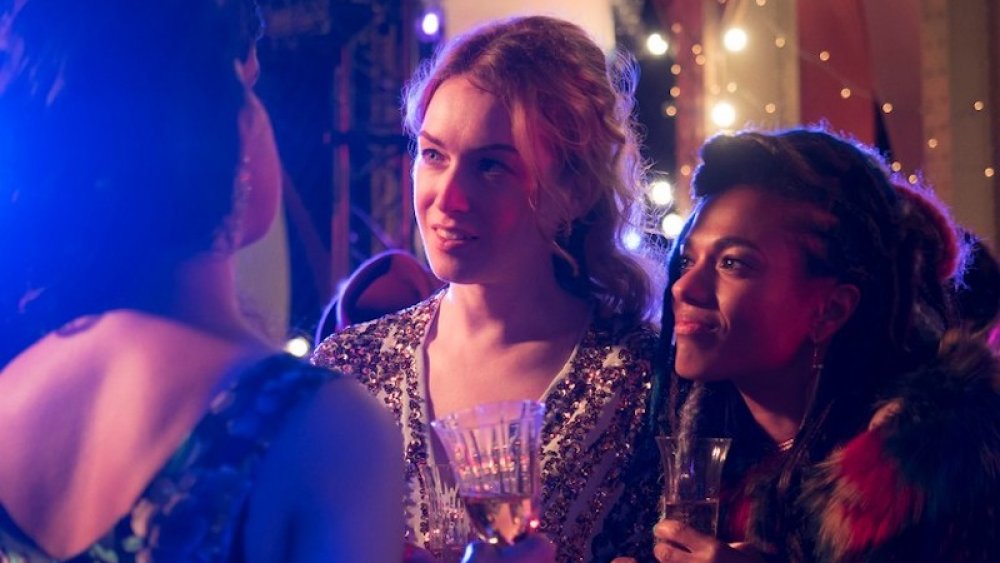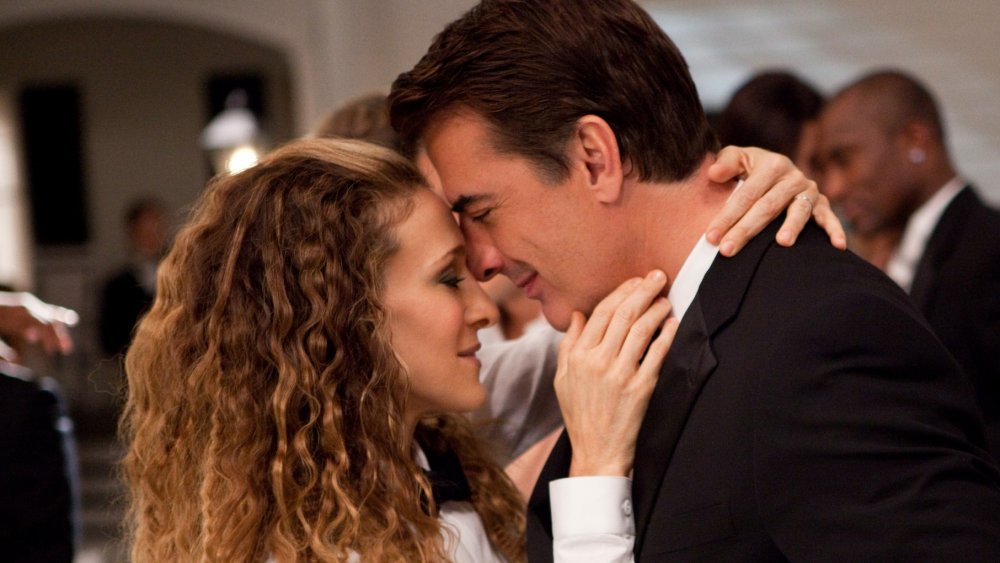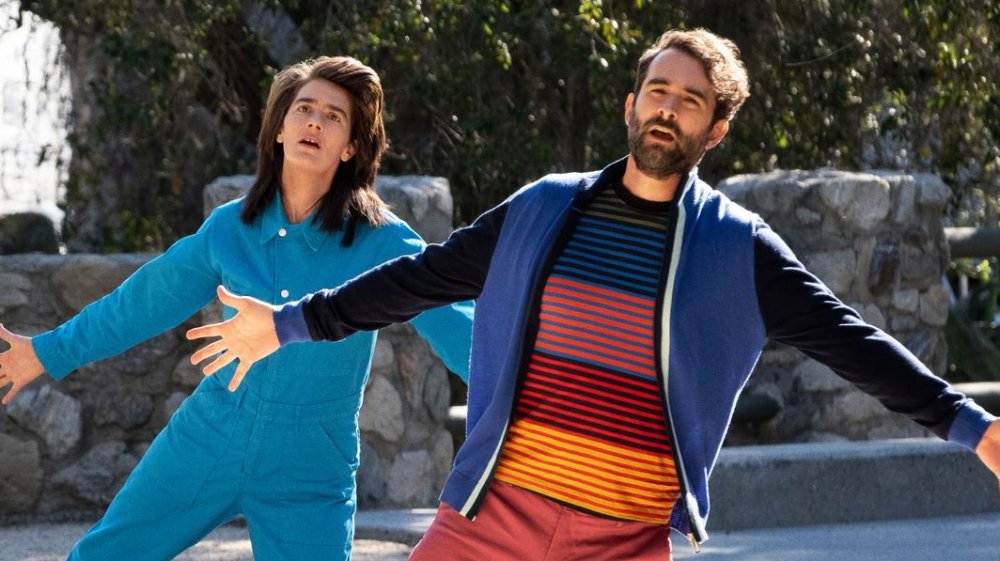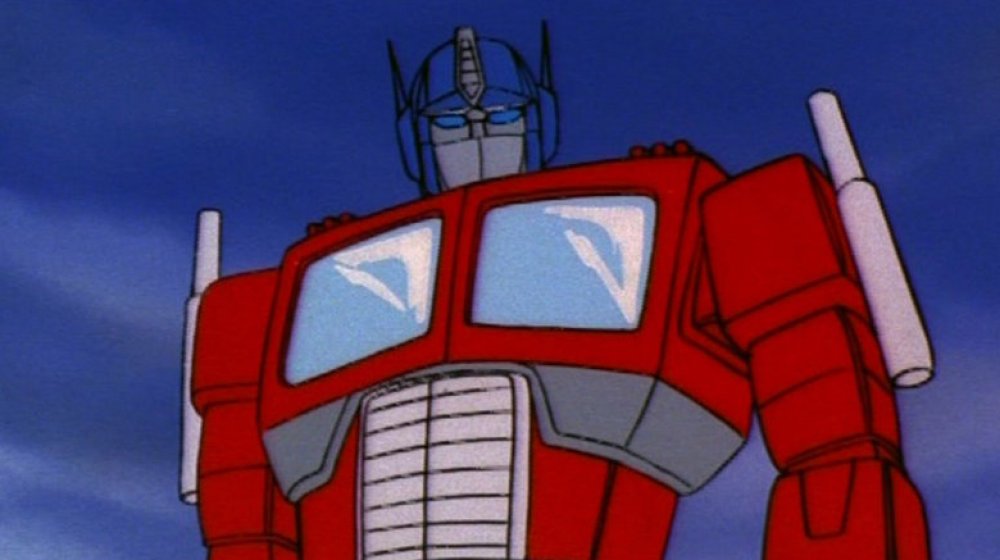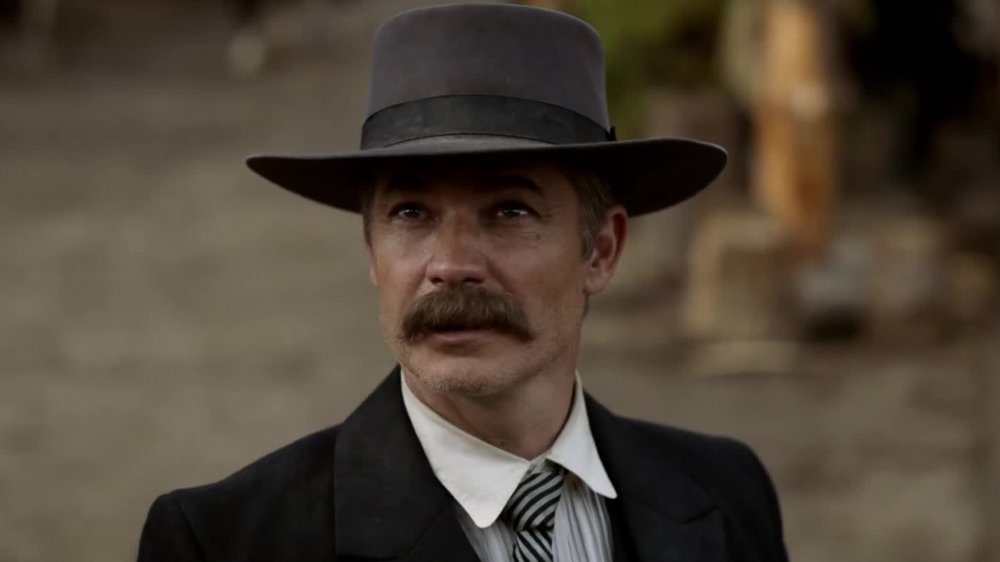TV Shows That Got A Movie To Wrap Up The Ending
Of all the branches of show business, it's television that might be the most "business" oriented, which is to say that whatever networks put on the air and choose to let remain on the air is driven by profits. Commercial networks and cable channels rely on advertising revenue to stay afloat, while premium services like HBO and streamers like Netflix have to keep subscribers paying their monthly fee.
In other words, television providers study various data streams to determine which shows people are watching, and the shows that aren't bringing in a big enough group — in relation to its production costs — get the boot. It's nothing personal, it's just business. But oftentimes, those shows have attracted a small but devoted audience, fans who are heartbroken when their favorite series is cancelled before its writers get a chance to wrap up loose threads, resolve cliffhangers, or set up a satisfying ending.
But the most loved shows also tend to have the most vocal and driven audiences and creators, people who can work in tandem to bring about an agreeable solution — a wrap-up movie. Here are some canceled TV shows that were lucky enough to get a finale movie long after they left the air.
Firefly took to the skies with Serenity
Joss Whedon is responsible for some of the most original and beloved shows in television history. He's responsible for the genre-bending Buffy the Vampire Slayer, its supernatural detective spinoff, Angel, and the Western-in-space Firefly. Airing on Fox in the fall of 2002 in an overlooked Friday night time slot, Firefly attracted minuscule ratings and got canceled after just 11 episodes. Nevertheless, it won an Emmy Award for its visual effects, made a star out of Nathan Fillion (as Captain Malcolm Reynolds), and built up one of the most passionate fan bases ever.
Needless to say, 11 episodes just wasn't enough time to explore the vast and novel world of Firefly, which focused on nine outcasts (all on the run for different reasons) as they traveled from planet to planet in their small spaceship, smuggling and dealing in the year 2517 in the aftermath of a bruising civil war. Firefly devotees bought so many DVDs of the show within such a short period of time that by 2005, just three years after its cancellation, Universal Pictures released Serenity. Named for the central ship of Firefly, this big-screen sequel and wrap-up movie filled in the backstories of its characters, completed their arcs, answered some compelling questions (where did the Reavers come from?), and finally gave some peace to the long-hunted Tam family.
Breaking Bad wrapped up its ending with El Camino
Breaking Bad is arguably the closest television has ever come to feeling like a classic novel, with an everyman slowly descending into darkness. Over the course of six seasons, it showed the rise and fall of Walter White, a once-brilliant scientist turned high school teacher who pays for his medical bills and his family's future by becoming a New Mexico drug kingpin.
The show ended spectacularly and definitively in 2013, with Walter (four-time Emmy winner Bryan Cranston) dying on the floor of a meth lab to the strains of Badfinger's "Baby Blue." Walt apparently got caught up in the gunfire of an automatic machine gun contraption he built in the trunk of a car to kill a Neo-Nazi crime ring that had been holding his partner in crime and BFF, Jesse Pinkman (Aaron Paul), hostage and forcing him to make meth. In the final moments of the final episode, Jesse speeds off in a car, screaming in happiness and relief, free of all of his tormentors and a life of bad decisions and outcomes.
But what really happened to Jesse after he got to live? That's all revealed in El Camino, a made-for-Netflix movie released in October 2019. The film picks up immediately after the show ends, with Jesse struggling from serious PTSD and trying to figure out how to begin his new life. Haunted by painful memories, things get even more complicated when Jesse needs to get his hands on a pile of cash to make his getaway ... but he's not the only one looking for the money. It's a poignant little send-off to one of Breaking Bad's best characters, putting a nice bow on the bloody show.
Dead Like Me took a look at life after death
Bryan Fuller has carved out a niche as a master of acclaimed, extremely original television shows that attract a small legion of fans ... and that wind up canceled because they're too quirky to land huge viewerships. Among Fuller's lamented, short-run gems, we've got Wonderfalls, Pushing Daisies, Hannibal, and Dead Like Me.
Running for only 29 episodes in 2003 and 2004, the touching, darkly funny, supernatural Showtime drama concerned a just-graduated Seattle woman named George Lass (Ellen Muth), who, after being struck and killed by a toilet seat that fell off the Mir space station, is trapped in limbo and must work (for a while) as a soul-collecting reaper. While dealing with being dead and her new cosmic duties — and also inhabiting a corporeal form, necessitating she do young adult stuff like find a job and a place to live — she falls in with a group of other reapers that become her family, including leader Rube (Mandy Patinkin), British drug addict Mason (Callum Blue), traffic cop Roxy (Jasmine Guy), and old-time movie actress Daisy (Laura Harris).
In 2007, producer MGM announced a slate of made-for-DVD movies based on some of its properties, including Dead Like Me, which had built up a following after its cancellation. Dead Like Me: Life After Death became available in 2009, and it updated viewers on whether or not those reapers had crossed over to the afterlife yet. Rube had, George hadn't, and Daisy was played by a new actress (Sarah Wynter).
The fans brought back Veronica Mars
A reinvention of Nancy Drew and classic detective noir, Veronica Mars starred Kristen Bell as a high school student and talented detective who works for her father (Enrico Colantoni), a former police chief who becomes a private investigator after bungling a murder investigation in the seedy, corrupt, money-ruled town of Neptune, California. The show lasted just three seasons (2004–2006) on television, but creator Rob Thomas gave his all to reviving it.
In fact, he produced a short proof-of-concept video for a fourth season of the series that found teen sleuth Veronica a bit older and in training as an FBI agent, but Warner Bros. turned it down. A few years later, Thomas proposed a Veronica Mars movie. Unable to get Hollywood on board, Thomas asked the fan base directly for the money necessary to make the movie ... and in 11 hours, the project reached its funding goal.
In 2014, Veronica Mars — the movie — debuted in a few theaters and on streaming services. And the plot was vintage Veronica, in that a now 20-something Mars returns to Neptune to solve the mysterious death of an old classmate who may have been murdered by Logan Echolls (Jason Dohring), the smarmy, privileged, troubled local boy with whom Veronica has unresolved romantic feelings.
ALF got a happy ending thanks to its wrap-up movie
Believe it or not, ALF was one of the most popular sitcoms of the 1980s. That success is a bit inexplicable because ALF was such a weird entry in an otherwise sedate and predictable world of family sitcoms, centered on a fuzzy alien named Gordon Shumway from the planet Melmac who crash lands in suburbia and lives with a family, devouring their junk food, desperately trying to eat their cat, and waxing nostalgic on the strange customs of his home world, all while trying to avoid detection by the government. After four years of several humans and an alien hanging around their house, ALF (short for "alien life form") went surprisingly dark for its finale.
In the 1990 episode "Consider Me Gone," Gordon receives a transmission from a couple of old friends asking him to join him on their new home planet. The villainous Alien Task Force hears the message, too, and shortly after Gordon sets off, the agency captures him and keeps him prisoner. Six years later, fans finally got to find out what became of their little alien friend. In the 1996 made-for-TV movie Project ALF, two Air Force scientists bust Gordon out of his cell, and after he avoids recapture and exposes an insidious government conspiracy, he's named an ambassador to Earth and gets to stay free.
Netflix finally gave us a Sense8 film
Debuting in 2015 as one of Netflix's first forays into original, dramatic programming, Sense8 gave credibility to the streamer, as the sci-fi mystery show was the creation of Babylon 5 helmer J. Michael Straczynski and Lana and Lilly Wachowski, the visionary siblings behind The Matrix. As for the premise, it focused on eight otherwise unconnected people around the world who become "sensates," psychically linked telepaths who can trade knowledge and skills via mind-link after a figure named Angelica chooses death over capture by a spooky villain named Whispers.
As the series went on, the sensates became closer and navigated their powers and the reasons behind them while fending off the forces that wished to destroy them. The second season of Sense8 ended on a cliffhanger. That was especially unfortunate for Sense8 fans because Netflix didn't order a third season. Eventually, Netflix acquiesced to viewers' demands and produced a Sense8 movie to provide a proper ending and answer any lingering questions about why and how sensates can do what they do.
Sex and the City got two movies to wrap things up
It wasn't like Sex and the City was a little-watched cult favorite that struggled for survival and attention. Based on Candace Bushnell's chatty and witty columns, the 1998 to 2004 series about love, dating, and fornicating in the Big Apple scored some of HBO biggest ratings numbers ever, and in 2001, it became the first non-broadcast show to win Outstanding Comedy Series at the Emmy Awards. Its influence went way beyond premium cable, too. It helped make brunch-with-friends a mainstream pastime outside of New York City, along with popularizing the cosmopolitan cocktail, Christian Louboutin shoes, and taking online quizzes to figure which character one most resembles, personality-wise — Carrie (Sarah Jessica Parker), Samantha (Kim Cattrall), Miranda (Cynthia Nixon), or Charlotte (Kristin Davis).
Sex and the City was so indelible that it led to multiple spinoffs, such as the CW's prequel show, The Carrie Diaries, and two theatrically released movies, the first of which was released in 2008. It wasn't enough for fans that the show ended sweetly and appropriately with Carrie abandoning her new lover and Paris to return to her true love of New York (the "city" of Sex and the City) and old boyfriend, Mr. Big (Chris Noth) — they had to see what came next. And if you're wondering what happened in the movie, they get married, of course.
Homicide: Life on the Street got one final mystery to solve
Before he brought the complex, devastating, and demystifying story of The Wire to HBO, David Simon worked as a Baltimore reporter and wrote Homicide: A Year on the Killing Streets. That's the basis for Homicide: Life on the Street, another Wire precursor and about the darkest police drama to ever air on network TV. The police detectives on Homicide weren't always heroes, and the psychological weight of investigating murders weighed on their minds and souls, particularly because they sometimes went unsolved and unpunished. Andre Braugher became a breakout star for his work as conflicted, jaded detective Frank Pembleton, winning an Emmy Award in 1998.
Not including a brief run in the Nielsen top 30 for its second season, Homicide was a ratings flop, generally finishing in the 60s or 70s of the annual viewership charts. The show's seventh and final season wound down in 1999, but a year later, NBC brought back the show for one night only in the form of Homicide: The Movie. The plot follows ex-police lieutenant Al Giardello (Yaphet Kotto) as he runs for mayor on a drug legalization platform, only to be gunned down just before the election, prompting nearly every former Homicide character to return to the Baltimore PD to solve the crime. Even actors who'd left the show during its run came back, including Braugher, bringing a true sense of completion to the series.
The Transparent movie helped the characters, actors, and fans move on
Transparent was a quiet, extremely sensitive show about identity and how discovering your true self both reflects on your history and the ramifications it can have on a family. At the center of the show was Jeffrey Tambor, an elderly, retired political science professor and father of four who revealed that she'd always identified as a woman and had decided to start living life as such. As Maura Pfefferman explored this (and found a place in the LGBT community), Transparent looked at how Maura's change affected the other Pfeffermans and how they looked into the parts of themselves that they'd similarly ignored or stifled for years, particularly their sexual and gender identity, their cultural history, and religious faith.
From a production standpoint, it was especially advantageous that Transparent had such a well of material from which writers could draw upon when the central figure had to be abruptly written out. After Tambor was accused by members of the cast and crew of multiple acts of sexual harassment, he was fired. Already renewed for a fifth season, Transparent's creative team eschewed a final run of episodes in favor of a small-screen movie, which also happened to be a musical, allowing the characters to find some peace in their own struggles while also mourning the death of Maura Pfefferman.
The Transformers: The Movie was both an end and beginning
The Transformers was never supposed to be anything more than a daily, 30-minute advertisement intended to get its audience of children hyped up to buy action figure versions of the show's characters — robots from space who hide out on Earth disguised as mundane vehicles and familiar objects. But the first Transformers series, debuting in 1984, gave such an elaborate backstory and so thoroughly explored the saga of the heroic robots (the Autobots) and the evil ones (the Decepticons) that the series became a compelling soap opera, albeit an animated one with lots of fights, violence, property destruction, and sci-fi weirdness.
In serving both of the show's trajectories — to make money and to tell a good story — the first generation of the Transformers franchise concluded with 1986's theatrically released The Transformers: The Movie. Set 20 years after the TV series, in the futuristic year of 2005, the Decepticons have conquered Cybertron, homeworld of the Autobots, who work hard to expel the invaders while also having to fend off Unicron, a gigantic robot that eats planets. Interestingly, The Transformers: The Movie was both an ending and a beginning, as it set up the events for more Transformers TV seasons, featuring new robots to replace the ones who died in the film.
Deadwood finished its story over a decade later
Deadwood was an ambitious series that ran from 2004 to 2006, and it was one that presented possibly the most unflinchingly realistic portrait of the Old West ever. The acclaimed, Emmy-winning series featured a large, ensemble cast portraying both historical and fictional characters as they negotiated an 1880s Gold Rush town in the Dakota Territory. But it all really boiled down to a case of complicated good guys vs. complicated bad guys.
In the series, Sheriff Seth Bullock (Timothy Olyphant) is a lawman who comes to the town of Deadwood to open a hardware store, but he feels compelled to institute justice when he witnesses the brutality and corruption of drug dealer, pimp, and saloon owner Al Swearengen (Ian McShane). And their bloody, muddy feud ended after just three seasons. Why? Well, HBO split Deadwood production costs with Paramount, who controlled the international rights to the series. Since the two parties couldn't reach an agreement over profit arrangements prior to the fourth season of Deadwood entering production, the episodes never got made, and the show was effectively canceled when the actors' contracts expired.
HBO wanted to keep creator David Milch happy but also focused on his new show for the channel, John from Cincinnati, so the company offered him a six-episode Deadwood wrap-up mini-season. He turned it down but counter-offered with two Deadwood finale specials. HBO accepted, but those specials never happened. Finally, in 2019, the production companies, HBO, Milch, and the busy Deadwood cast members reunited for Deadwood: The Movie, a film that brought a close to Bullock and Swearengen's bitter rivalry.
